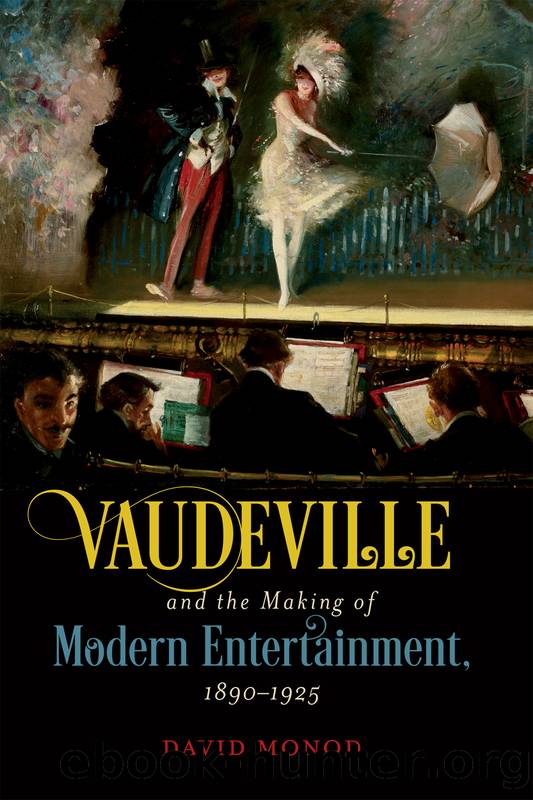Vaudeville and the Making of Modern Entertainment, 1890â1925 by David Monod

Author:David Monod
Language: eng
Format: epub
Publisher: The University of North Carolina Press
Published: 2020-06-15T00:00:00+00:00
A MODERN SELF?
Scholars question whether the unitary, authentic self survived the passage to modernity. The identities people create, they point out, are only as coherent as the communities, customs, habits, and traditions that protect them and the stability of the physical world in which they operate. The sense of oneself can be destabilized when communities fragment, customs are lost, and values come under attack. Migration, environmental destruction, or a crisis of faith can lead to traumatic questioning of values and identities. Some historians and social theorists argue that the historical experience of modernity produced this kind of psychic dislocation because it created a generalized feeling of powerlessness that expressed itself in a âcrisis of self.â In the fast-changing modern world, they maintain, everything became contingent, and people came to expect their beliefs and values to be challenged. Communities dissolved as the lives of distant public figures became better known than those of neighbors. Merchandisers responded to the crisis by offering commodified versions of identity for mass consumption. For British sociologist Anthony Giddens, doubt became normative at the fin de siècle, and self-identity came to be associated with what remained in peopleâs control: possessions, lifestyles, and off-the-shelf methods of self-actualization. Historian T. J. Jackson Lears argues that advertising began to define self-identity in the early twentieth century as traditional values lost their fixity; he refers to a new âweightlessnessâ affecting concepts of being. Susan Glenn sees a crucial âreorientationâ in modern culture toward a âperformative model of personalityâ at the turn of the century, which she suggests popular entertainers made manifest. And for Warren Susman, the nineteenth-century idea that an individual had a âfixedâ and innate âcharacterâ gave way in the early twentieth century to the more fluid concept of âpersonality,â defined as poses adopted in order to sell oneself to others.38
Vaudevillians worked close to the center of the cultural maelstrom that was modernity. They were the first popular entertainers to make personality paramount, and they were the first to achieve modern celebrity. Their self-promotion involved the performance of authenticity, and they commodified their success and presented character as something one stepped in and out of, at least onstage. This is why they can seem exemplars of the contingent, performance-oriented modern self. The polished English star Ada Reeve, for example, communicated the public image of a demure âgentlewoman.â Her personality âis the realization of grace and graciousness and her dancing, which she indulges in slightly, is light footed and airy without vulgarity.â In Caroline Caffinâs view she was a model of âstudied deportment.â But Reeve also liked to surprise her audience by singing songs that were coyly sexual. âThis young lady has leanings toward life that are not included in the curriculum of the schoolroom,â Caffin added, rather disapprovingly. Some of Reeveâs songs described clandestine love affairs, often âcarried on under the nose of authority. And they are sung with a relish instead of disapprobation.â Caffin was particularly disturbed by Reeveâs rendition of her most famous song, âDo Sue Do,â which, in the performance she witnessed, was accompanied by âan extraordinary wriggle of head and chest.
Download
This site does not store any files on its server. We only index and link to content provided by other sites. Please contact the content providers to delete copyright contents if any and email us, we'll remove relevant links or contents immediately.
| Acting & Auditioning | Broadway & Musicals |
| Circus | Direction & Production |
| History & Criticism | Miming |
| Playwriting | Puppets & Puppetry |
| Stage Lighting | Stagecraft |
Call Me by Your Name by André Aciman(20516)
Ready Player One by Cline Ernest(14675)
How to Be a Bawse: A Guide to Conquering Life by Lilly Singh(7486)
Wiseguy by Nicholas Pileggi(5786)
The Kite Runner by Khaled Hosseini(5179)
On Writing A Memoir of the Craft by Stephen King(4944)
Audition by Ryu Murakami(4930)
The Crown by Robert Lacey(4817)
Call me by your name by Andre Aciman(4684)
Gerald's Game by Stephen King(4654)
Harry Potter and the Cursed Child: The Journey by Harry Potter Theatrical Productions(4506)
Dialogue by Robert McKee(4404)
The Perils of Being Moderately Famous by Soha Ali Khan(4220)
Dynamic Alignment Through Imagery by Eric Franklin(4217)
Apollo 8 by Jeffrey Kluger(3709)
The Inner Game of Tennis by W. Timothy Gallwey(3687)
Seriously... I'm Kidding by Ellen DeGeneres(3633)
How to be Champion: My Autobiography by Sarah Millican(3593)
Darker by E L James(3516)
